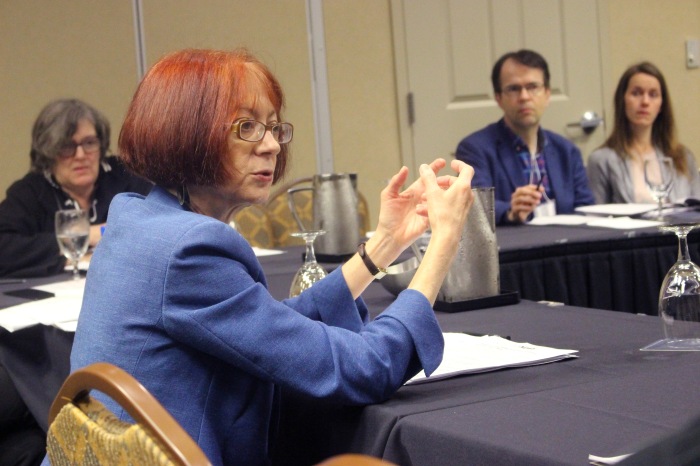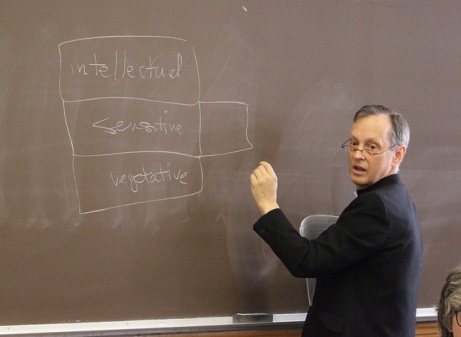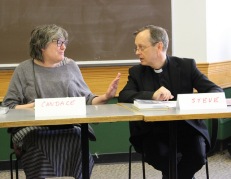
There is little doubt as to the elevated status of curiosity in our modern secular culture. We are surrounded by its praise and by institutions that aim at nurturing and encouraging our desire to know. So natural and integral is this desire to our nature and experience that, bereft of it, human life appears dreary, and human society, dystopian. Indeed, for many, the mere thought of suppressing the fervent curiosity of children is petrifying, akin to depriving them of one of their senses. At times, curiosity seems like the centerpiece of modern education. Parents send their kids to classes to open their eyes to as many realms of knowledge as possible with the hope that their curiosity will be nurtured. Being curious has become not only the benchmark of a happy and promising childhood but also of a vital adulthood. As long as one is curious, one has not lost one’s vitality; one is still alive. In its absence, our life is dry and ossified.
The exaltations of the desire to know are by no means a peculiarity of our zeitgeist, but it is worth noting that curiosity was also condemned and even considered a sin by great thinkers like Augustine, Aquinas and Montaigne. The very fact that curiosity has not always been conceived as a virtue should pique our curiosity. How could the desire to know be a sin? What could possibly be wrong with pursuing our curiosity? Though the critique of curiosity offered by these early thinkers partly arises out of religious and social commitments more foreign to contemporary society, many of their concerns are as pertinent to us now as they were. Considering their views affords not only a critical distance from our wholehearted admiration for curiosity, but a more robust and nuanced concept of curiosity; one especially relevant to our understanding of curiosity’s place in education.
I first started investigating the virtue of curiosity following a rather mundane academic experience. A special kind of curiosity accompanies the reading of academic books in one’s own field of research. We might call this kind “a sober curiosity”; akin perhaps to the alertness of sense a devout gardener experiences in daily attending her beloved garden. It is an alertness to subtle changes in the familiar paths of her garden, rather than expectant of novelties or unknown marvels. With this “sober curiosity” I turned, not long ago, to reading a book in contemporary ethics. My curiosity, however, gave out not long after, as I found its treatment of subjects dear to my heart overly abstract and technical. After a short break, I reopened the book and noticed the following epigraph:
[…] I flatter myself that I understand all sorts of curiosity – curiosity about daily facts, daily things, about daily men. It is the most respectable faculty of the human mind – in fact, I cannot conceive the uses of an incurious mind. It would be like chamber perpetually locked up.
Joseph Conrad Chance
I felt strangely admonished by these words. After all, my own sober curiosity has just been stifled by the very work that followed. What did the author of the work intended by opening with this epigraph? Was it intended as a literary way to obviate accusations concerning the dry nature of his work: such accusations, the epigraph suggests, attest to the reader’s failed curiosity and “useless mind”? Or perhaps, I thought, the point was not to admonish those whose curiosity faltered in the face of a dry academic work, but rather to disclaim: “this work will capture only a mind of prodigious curiosity.”
Whatever the author’s intention might have been, curiosity itself then became the subject of my curiosity. The epigraph’s unchecked praise of curiosity in association with the nature of his book seemed wrong to me but I wasn’t sure why. Is any object, even the most boring, worthy of our curiosity? Can curiosity be ‘excessive’? What if desiring to know every fact is a deficiency rather than a virtue? If curiosity is like other psychological virtues—e.g., moderation or courage—we should expect it to be a mean between two extremes. But what are those extremes?
As I mentioned above, curiosity has not always enjoyed the elevated status it has today. The history of ideas is scattershot with thinkers who cautioned against the dangers it poses. In a famous part of Plato’s republic we encounter an aspect of curiosity I believe few would encourage:
Leontius, the son of Aglaion, coming up one day from the Piraeus, under the north wall on the outside, observed some dead bodies lying on the ground at the place of execution. He felt a desire to see them, and also a dread and abhorrence of them; for a time he struggled and covered his eyes, but at length the desire got the better of him; and forcing them open, he ran up to the dead bodies, saying, Look, ye wretches, take your fill of the fair sight. [439e]
If curiosity is a desire to knowledge, then Leonitus’ is a case of lust, or as St. Augustine put it, the “lust of the eyes”. It is an excessive case of the desire to know, one whose object we consider improper, in this case, we conceive of it as improper because it does not pay respect to the dead and because it leads to a terrifying and painful experience. For similar reasons, it is commonplace to admonish voyeurism and gossiping, and consider them as vices. We might see such vices as types of excessive curiosity, for in them, the desire for knowledge drives agents to compromise other values such as respect for others, their privacy and their good reputation.
We see then, that despite curiosity’s positive reputation there are cases where it can be seen as excessive and a vice. Thus, if curiosity can be harmful and sinful it would seem to follow that rather than being intrinsically good, its goodness depends on external circumstances and considerations. If so, then, against our contemporary intuition, it would seem that curiosity is not a virtue at all but rather a psychological disposition that can be either good or bad, depending on the situation. What, then, are we to make of this tension between curiosity as a virtue and its ethical ambiguity?
We can begin resolving the tension by distinguishing between the desire to know and the virtuous way of having this desire, i.e., curiosity. As long as we understand curiosity as a desire, i.e., the desire for knowledge, we should expect exactly the odd result we have received, since, in general, desires are not, in and of themselves, virtues. Rather, they are good only insofar as they are exercised in the right way, namely, neither too much nor too little. Consider, for instance, the desire for food: a too vigorous appetite is considered gluttonous, while an overly weak one expresses austerity or apathy, turning eating into a necessary but unpleasant task; neither, clearly, are considered virtues. A moderate appetite, however— neither gluttonous nor insensitive—we conceive as a virtue. Hence, virtue (e.g., moderation in relation to eating) is not a mere desire but rather the right way of having a desire. We can now trace the root of the confusion in relation to curiosity: it is a mistake to define curiosity both as a virtue and as a desire. Conceived as a virtue, curiosity must be the right way of desiring knowledge—the middle way between excessive desire (manifested in vices such as voyeurism) and too little (e.g., apathy).
All that said, the above discussion does not yet explain my response to the epigraph of the dry academic book. Though I sensed that having interest in this book would indicate excessive curiosity, being curious about it clearly would not have constituted something like voyeurism or gossiping—both instances where the desire for knowledge infringes on other values; it is hard to see what value is violated by finding a book interesting. As long as our desire causes no harm, it is tempting to think that there nothing is wrong with both having and satisfying it. Indeed, one may suggest, the stronger the desire the better; for a life that consists of prodigious desires is life filled with excitement and pleasure (with the provisos that we can satisfy them and no harm is made by that). On the basis of this position, it follows that the more vigorous the desire for knowledge, the better. Accordingly, she who can take interest in everything—e.g., every stone, every event, every constellation of objects etc.—is a happy person. It was in this vein that John Hobbes and Francis Bacon argued that the desire for knowledge is the greatest gift of man, for it offers man an endless and insatiable source of pleasures, unlike other appetites we share with animals. Understood as a source of pleasure, there seems to be no point in limiting the objects of a desire (with the above provisos).
What then is the source of unease with the idea that it is a virtue to take interest (i.e., desiring to know) everything? I think we can find a clue in another Platonic text: in the Gorgias, Calicles claims that the happiest life is one in which there is the greatest amount of desire and satisfaction. In response, Socrates asks him whether “a man who has an itch and wants to scratch, and may scratch in all freedom, can pass his life happily in continual scratching.” [494d] Socrates’ point, I take it, is that pleasures, important as they are, cannot be the sole consideration in evaluating human life. Life spent in scratching one’s back strikes us as eerily empty and meaningless. Generalizing from this Socratic example, we may say that pleasure cannot be the only measure of desire’s goodness. In evaluating a desire, like the desire for knowledge, we ought also to consider what is the good associated the desire. Moreover, as we shall see presently, once we understand the good toward which a desire is oriented, we also see that not all possible objects of a desire are equally of value.
Consider the desire for food once more. Surely it is pleasurable to satisfy our hunger, and savoring our favorite dishes is a great pleasure. However, there is more to eating than pleasure. Done properly, eating is also good because it sustains our health; it is crucial to human life; it isn’t merely pleasurable. Furthermore, once we note that health is an end of eating we can also see that not all kinds of food are equally good; desiring unhealthy food makes one’s appetite deficient even though one might still take great pleasure in eating it. Fully understanding a virtue, then, consists of knowing which objects are proper for it and which aren’t.
Against this backdrop, we can now understand my uncurious reaction to the book not (necessarily) as a sign of feeble curiosity, but rather (hopefully), as a recognition of its unworthiness as an object of my desire for knowledge. But how are we to determine whether my sense of its unworthiness is valid? As we have just seen, looking for the good associated with the desire to know is the way of tracing curiosity’s proper objects. Of course, answering these questions in any satisfying way exceeds the limits of the present essay. We might begin, though, by imagining the following case: it would be unjust, for instance, to accuse one of a lack of curiosity for not having any desire to know the number of tiles on the roof of a random building one sees. Indeed, showing such an interest would warrant special explanation. In the absence of such explanation, we might consider it a perversion of one’s desire to know—akin to that limitless, gluttonous appetite. But what makes the desire to know the number of tiles perverse? It seems to me that it is perverse since, strikingly, it has nothing to do with our life in general. We neither have a use for this kind of knowledge nor does it bear on any of life’s significant activities. Now, if told that this roof-tile enthusiast was an architect of rooves, we might become more understanding to her interest in the number of tiles; it may still be a peculiar interest, but not entirely outlandish. This example may suggest that objects worthy for one’s curiosity are objects that relate to one’s involvements, concerns and cares in the world; a result supported by the etymological sources of curiosity in the Latin cūra, which means, care, concern, or worry.
This short essay has aimed to set up the stage for a deeper understanding of curiosity as a virtue. Specifically, as we have seen, what we ought to admire and cultivate is not the mere desire to know, but the virtue of this desire; the right way of having it. In cultivating curiosity, as in cultivating other virtues, our aim must be to allow it to exist in harmony with other values and goods. Moreover, we need to cultivate the desire for proper objects of knowledge. An encouragement of the desire to know without orienting it to facts and subjects that should matter to us may result in an excessive and alienating desire rather than a virtuous one.
Amichai Amit is PhD student in philosophy at the University of Chicago. His research concerns the foundations of ethics and normativity. He also has strong interests in the history of philosophy (ancient and German idealism) and existentialism. He previously received an MA in Philosophy from Tel-Aviv University.









